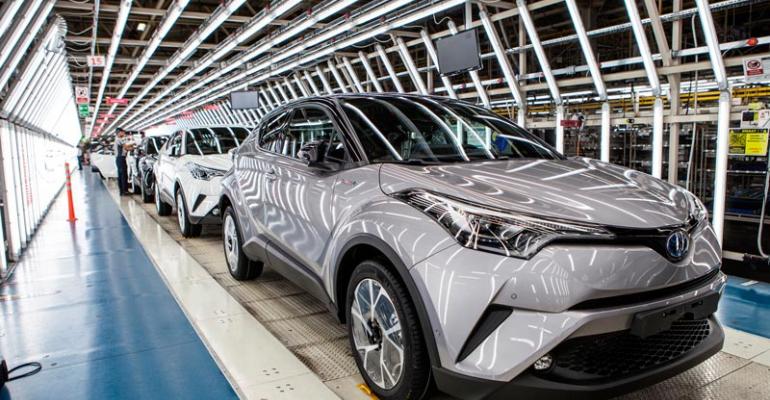BEIRUT – The severe depreciation of the Turkish lira (TRY) has adversely affected the country’s car sector, with domestic sales down by half from year-ago.
While Turkey’s $31 billion automotive export market has not been as badly impacted, automakers’ bottom lines have taken a hit due to the higher cost of importing key raw materials.
The Turkish automotive sector already was struggling at the beginning of the year amid an economic slowdown, high interest rates and inflation. Domestic sales grew just 2% in the first quarter, the lowest rate in four years. By the end of the second quarter, sales were down 20%, according to the Automotive Distributors’ Assn., attributed in part to average interest rates for vehicle loans rising to 18.32%, the highest since 2009.
In August, the lira reached a low of TRY7:$1, down 40% from the beginning of 2018, and by 60% against the U.S. dollar and euro since 2009. In 2015, the exchange rate was TRY2.4:$1. This depreciation (lower left) has hurt the economy, with Turkish banks’ exposure to foreign debt up 50% in value terms this year and thousands of businesses struggling to pay $221 billion in foreign currency loans.
As a result of depreciation, inflation and low consumer confidence, Turkish automotive sales dropped 52% in the third quarter, according to the distributors’ association, with the 2018 market down 20% overall compared with 2017. Imports also dropped, by 23%.
The downturn is expected to continue. “We forecast the domestic market will decrease by 35% to 40%, bringing the total domestic market from 987,000 units in 2017 to around 600,000 units in 2018,” says Haydar Yenigun, chairman of Turkey’s Automotive Manufacturers Assn. (OSD).
The market had been steadily growing from about 360,000 sales a year in the early 2000s, driven by low car ownership at 275 cars per 1,000 people compared with an average of 500 in Europe, according to the Turkish Statistical Institute.
Such growth also was in line with the expansion of automotive production, going from 374,000 units in 2002 to 1.7 million units in 2017, an average of 8% per year, according to OSD figures, with 1.3 million units exported.
The country has 17 plants run by 15 OEMs – including Daimler, Fiat, Ford, Hyundai, Toyota, Renault, Honda, Isuzu and MAN – and is Europe’s fifth-largest vehicle producer as well as the leading manufacturer of light commercial vehicles, according to the OSD. There also are about 1,100 component suppliers, with between 50% to 70% of production going to local manufacturing, according to the OSD.
With the remaining components imported, along with other key raw materials such as aluminum, steel and petrochemicals for plastics, the lira’s depreciation has driven up importation costs for manufacturers.
“The cost base has increased, directly impacted by foreign exchange movements,” Yenigun says. “We estimate raw materials have risen between 20% to 70%, depending on the material. And depending on individual brands, the recommended retail prices (per unit) have increased in the range of 30% to 40%.”
Turkey’s low labor costs, averaging $6.89 an hour compared with $27.50 in the European Union, according to 2017 figures compiled by EU statistical agency Eurostat, enabled the sector to be highly competitive, with exports accounting for 80% of production. Of the 1.3 million vehicles exported last year, Europe was the top destination with 986,000 units.
According to the OSD, exports overall are forecast to reach $31 billion this year, roughly equal to 2017. “We hope that the market will rebound to normal levels in 2021 and onwards,” Yenigun says.
The sector is hoping revisions to the Special Consumption Tax this year will bolster overall sales by applying lower rates to costlier vehicles.
The minimum tax rate of 45% on cars with engine displacements up to 1.6L is being applied to models costing up to TRY70,000 ($11,520), up from TRY46,000 ($7,569). The 100% SCT on cars with 1.6L to 2.0L engines is being applied to models costing up to TRY170,000, up from TRY114,000.
This would “increase the model options in the relevant tax segments,” says Hayri Erce, executive coordinator for the distributors’ association. “There is a need for incentives to raise our domestic market to the level of the global players in the automotive sector.”
 However, with inflation set to rise further, according to the World Bank, (it was 101% in August), and domestic demand projected to keep falling until mid-2019, the Turkish auto sector is set to contract further. “We see some manufacturers adjusting production schedules to accommodate the domestic sales loss, which could lead to layoffs in the months to come,” Yenigun says.
However, with inflation set to rise further, according to the World Bank, (it was 101% in August), and domestic demand projected to keep falling until mid-2019, the Turkish auto sector is set to contract further. “We see some manufacturers adjusting production schedules to accommodate the domestic sales loss, which could lead to layoffs in the months to come,” Yenigun says.
It is not clear whether the economic crisis will impact plans to produce by 2020 three models of the country’s first original car by the Automobile Joint Venture Group consortium of five Turkish companies (Anadolu Group, BMC, Kıraça Holding, Turkcell and Zorlu Holding), which was announced by the government in February. Neither is it clear whether Turkish manufacturers will be impacted by proposed U.S. tariffs on automotive imports, with the U.S. Department of Commerce still carrying out an investigation into Section 232 of the Trade Expansion Act of 1962.
“Such protectionist policies seem like they will make trade difficult and the predictability of the future difficult,” Erce says.





